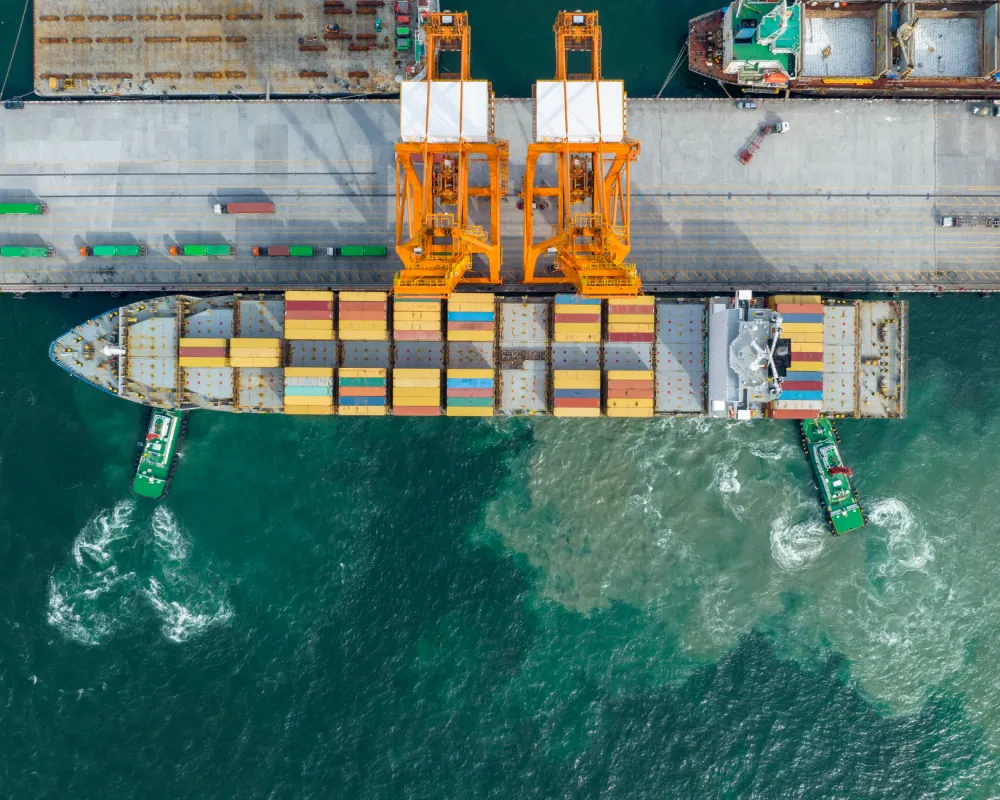
Aerial view of a large container ship docked at a port, surrounded by cranes and shipping containers.
How Automation Is Changing The Shipping Industry
Automation is changing industries worldwide, and the shipping industry is no different. As one of the most essential sectors supporting global trade, shipping has long relied on traditional processes that, while reliable, are now rapidly evolving due to technological advancements. Automation, driven by different technologies like artificial intelligence, robotics, and other smart systems, is starting to transform the way goods are moved, stored, and tracked, resulting in improvements in efficiency and even cost reduction. Whether you’re looking for shipping jobs or you are simply interested in the ins and outs of the maritime industry, we have you covered. Read on to find out more about how automation is changing the shipping industry.
Streamlining Shipping Operations
One way automation in shipping benefits companies is by making their operations smoother. By using automated systems, shipping firms can handle cargos, ports, ships with more exactness as far fewer errors are committed by people operating them. At ports are things like auto cranes and cars that are faster in terms of loading and unloading containers than their manual counterparts. The thing that powers such systems is AI mostly and it can cut down the time ships spend discharging goods inside harbors thereby making turn around faster and increasing throughput.
Autonomous Ships
Self-driving ships, one of the most thrilling yet terrifying advancements within the maritime realm. Although they’re still being experimented upon, a fraction of companies dedicate an enormous amount towards building such vessels. These types are manipulated from distant places over internet connections, or electronically directed on their routes alone, thereby, portending at best very minimal jobs losses plus fewer cases both minor and major errors that are left by people staffing them. Moreover they devise ways to sail through shortest passages; hence, they assist in promoting low consumption rates of gasoline through reduced resistance of hulls against seawater turmoil.
For instance, some companies like Rolls-Royce are working on projects to create cargo ships that are 100% autonomous. These vessels are equipped with advanced sensors, machine learning algorithms and GPS technology to better navigate the seas without the need for human intervention. The aim for these ships, and for all autonomous vessels to reduce operating costs and improve safety.
Enhancing Safety
Safety has always been a concern in shipping, with accidents at sea resulting in significant financial losses, environmental disasters, and, worse, loss of life. Automation is poised to enhance safety across the industry by helping to reduce reliance on human judgment. This is because human judgement can be subject to fatigue, stress, or inexperience.
Automated systems in shipping include collision avoidance technology, which uses sensors and AI to detect obstacles and other vessels, adjusting the ship’s course accordingly. Similarly, automated weather systems provide real-time data to ships, helping them avoid hazardous conditions like storms or rough seas. These systems allow ships to adjust their routes, avoiding accidents and ensuring the safe arrival of cargo.
Improving Inventory & Supply Chain Management
Automation is also playing a very significant role in the way inventory and the supply chain is managed. Through the use of the Internet of Things, for example, different devices and smart sensors allow shipping companies to track the exact location and condition of goods accurately in real time. This can help to monitor metrics like temperature, humidity, and other environmental factors, ensuring that perishable goods, such as food or pharmaceuticals, are stored in optimal conditions throughout the shipping process.
Conclusion
Automation is very quickly transforming the shipping industry in a broad number of ways, offering improvements in efficiency, safety, and cost-effectiveness. From autonomous ships to improvements in inventory and supply chain management, the future of shipping is becoming increasingly reliant on AI and automation technologies. While there are still some challenges to iron out to make the processes seamless, the benefits of automation are clear, and the shipping industry is ready to evolve in response to the changing demands of global trade.


